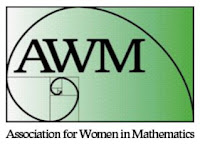Amalie "Emmy" Noether (1885-1932) is one of the outstanding mathematicians of all-time -- and yet, during her lifetime she got very little of the recognition that she deserved.
Consider these lines:
Today history books proclaim that Noether
is the greatest mathematician
her sex has produced. They say she was good --
for a woman. a stanza from my poem "My Dance is Mathematics"
In the past, people both inside and outside of mathematics have discriminated against women and minorities -- but the Association for Women in Mathematics -- AWM -- works to change that. One of their activities to increase awareness of math-woman and their achievements is an annual essay contest.
Here is this year's announcement:To increase awareness of women’s ongoing contributions to mathematics, the Association for Women in Mathematics and Math for America are cosponsoring an essay contest for biographies based on interviews of women working in or retired from mathematical careers. The contest is open to students in Grades 6–8, Grades 9–12, and Undergraduate. For more information, contact the organizer, Dr. Johanna Franklin, at johanna.n.franklin@hofstra.edu or see the contest webpage at
https://awm-math.org/awards/student-essay-contest/. The deadline is February 1, 2022.





